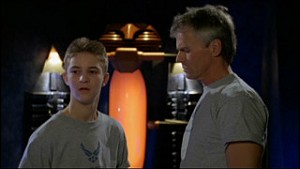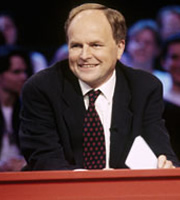My attitude towards Lady Russell has shifted over the years. When I was younger, I had far more sympathy with her than I have now.
My shifting attitude has to do with the fundamental message of Persuasion. The fundamental message of Persuasion is that being persuadable is not necessarily a bad thing. A rigid adherence to anything, whether it be a penchant for flightiness (Louisa) or a grudge (Captain Wentworth) or self-pity (Captain Benwick) can cause unhappiness and, even, a hit to the head.
Anne discourses on this theme at the end of the novel:
I was perfectly right in being guided by the friend [Lady Russell] whom you will love better than you do now. To me, she was in the place of a parent . . . I was right in submitting to her, and that if I had done otherwise, I should have suffered more in continuing the engagement than I did even in giving it up, because I should have suffered in my conscience.In other words, it isn't automatically a bad thing for a sheltered nineteen-year-old girl to listen to the advice of an elder.
Consequently, when I read the novel the first few times, although I thought it sad that Anne hadn't married Captain Wentworth when she was younger, hey, he could have died, and even if he didn't, he wasn't exactly in a position to support a wife, and since when should nineteen-year-olds be making life-altering decisions anyway?
As I've gotten older, however, the narrowness of Lady Russell's advice gets harder and harder to take. It is not just that her initial advice was bad ("I certainly never should, in any circumstance of tolerable similarity, give such advice," Anne states), but that Lady Russell doesn't learn from the experience. Seven years later, she still has the same perspective. When Captain Wentworth shows up in Bath, Lady Russell acts as if he is a neglible factor. She never reassesses her past advice; she never doubts herself; she goes right on trying to push Anne in a direction she doesn't really want to go.
But then Lady Russell is not a particularly intuitive person.
Both Will Elliot and Penelope Clay, outsiders, easily identify Captain Wentworth's importance to Anne. In the original text, Mr. Elliot begins to take steps to capture Mrs. Clay's attention shortly after Captain Wentworth's appearance in Bath. Both Will and Penelope are also flexible enough to see outside-the-box solutions to Anne's supposed dilemma at nineteen, one of which Captain Wentworth mentions:
"I too have been thinking over the past, and a question has suggested itself, whether there may not have been one person more my enemy even than that lady? My own self. Tell me if, when I returned to England in the year eight, with a few thousand pounds, and was posted into the Laconia, if I had then written to you, would you have answered my letter? Would you, in short, have renewed the engagement then?"
"Would I!" was all her answer; but the accent was decisive enough.And he probably would have contacted her if Anne had given him any encouragement alongside her initial refusal.
So not everything should be laid at Lady Russell's door: Anne was too absolute in her refusal; Captain Wentworth too resentful at not getting what he wanted. But Lady Russell certainly bears some culpability.
But since she won't ever understand why she might have been wrong, Anne and Captain Wentworth will have to settle for being happy anyway.
Lady Russell wanted Will to know that Captain Wentworth had stayed behind after the party to request Anne’s hand in marriage; Sir Walter had agreed.
“I couldn’t say no to such a gentlemanly countenance,” Sir Walter had told her that morning when he visited Lady Russell’s lodgings on Rivers Street.
Now Lady Russell gave Will a troubled look, her forehead creased; he realized he was supposed to appear astonished and hurt by the news, so he feigned a look of pained surprise.
“I did hope—” Lady Russell sighed. “He is not the man I would have chosen for her.”
Will said, “I had no idea—”
“Nor did I! Perhaps—” Lady Russell looked at him with wary hopefulness. She was too much a lady to say, Perhaps you could break the engagement, and Will presumed she considered him too much a gentleman to accept such a suggestion.
“They must have had a prior acquaintance,” Will said, twisting the knife in Lady Russell’s chagrin.
She flinched. “Perhaps I should have told you: they knew each other many years ago, but I didn’t want to embarrass Anne. I have done everything I could not to mention him around her.”
Because, of course, not acknowledging Captain Wentworth’s very palpable presence in Bath was sure to keep him out of Anne’s mind.
“I hope they may be happy,” Will said stoically.
Lady Russell patted his hand. “What a terrible disappointment for us all.”
As they exited Duffield’s, they encountered Anne and a companion on the pavement. Will saw from Anne’s slight frown that she did not appreciate Lady Russell’s preference for Will’s company over Captain Wentworth’s. He didn’t doubt that Anne would be disclosing Will’s true character to Lady Russell as soon as he strolled off.
He strolled off.
Should Lady Russell become convinced of his bad character, she would pressure Sir Walter and Elizabeth to drop his acquaintance. Their assurance in their own appraisal of Will might stave off the inevitable break, but for not much longer than a few weeks—not unless Will inflicted all parties with the full force of his rueful charm.
What would Penelope do once I was banished? Would she miss me?
He stopped by Camden Place. Everyone was out. He left a card, answered the butler’s bored queries: No, I won’t be returning this evening. I have a prior engagement.
He didn’t have an engagement, but he needed to get away from his extended family.
He should return to London. He was tired of waiting for fate to propel him in one direction or the other. He would get over Penelope. He wouldn’t spend the rest of his life like Willoughby second-guessing his past.
















